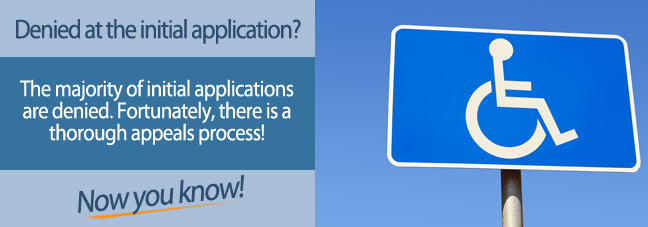If you apply for Social Security Disability and your claim is denied, you should not give up hope of receiving the Social Security Disability (SSD) benefits that you are rightfully entitled to. You have the option of going on to file an appeal of the decision. The first step of this appeal process is a request for reconsideration.
Many people make the mistake of assuming that it is better to file a new Social Security Disability (SSD) application than it is to go on and file a request for reconsideration on an existing claim. This is not the case. If you simply begin the application process for Social Security Disability (SSD) benefits from the beginning, your claim is likely to be denied again no matter how many times you decide to re-apply.
What To Do If Your Claim Is Denied
If your application is denied and you wish to receive Social Security Disability benefits, your best chance for success is to file for reconsideration with the Social Security Administration (SSA).
Most disability claims are denied during the initial review. Most reports indicate that about three-fourths of claimants receive notification of a claim being denied when it is reviewed for the first time.
Documentation is a necessity, so you must provide hard medical evidence that shows the severity of your condition and that supports your disability claim. Without detailed medical records and other documentation, Disability Determination Services (DDS) cannot determine the severity of your condition and whether you meet the specific criteria for approval.
You will need to make sure that DDS has access to all your medical records and any other supporting documentation. The more supporting evidence you can provide, the more likely that they are to see the severity of your condition and determine that your description is accurate and that you are unable to work for a living.
The more evidence that you can provide initially, the more likely you will be able to prove your claim earlier on in the process. You can retain the help of a disability lawyer at any time during the claims process. A lawyer will help you throughout the process and will help gather supporting evidence and documentation for your case and to prove that you are unable to work.
Filing for Reconsideration
Reconsideration is the second step in the Social Security Disability application process and is the first step in the appeal process. If your initial application is denied, you must file for reconsideration within 60 days of receiving the notice of decision from the Social Security office. If you do not submit your request for reconsideration within that 60-day time period, you will need to begin the application process all over again.
Social Security Disability: The Reconsideration Stage
When you file a request for reconsideration with the SSA, your application will be sent back to the Social Security office for review. The same office that handled your initial application will also be handling your request for reconsideration, but it will not be the same examiner reviewing your case at this stage of the process.
It is important to understand that the person who reviews your Social Security Disability reconsideration appeal is bound by the same rules as the person who reviewed your initial claim for Social Security Disability benefits. Because of this, many applications are denied at the reconsideration level. The exception to this rule is when vital information is left out of the initial application. Overall, approximately 86 percent of Social Security Disability claims are denied at the reconsideration level. Before applying for SSDI (Social Security Disability Insurance) reconsideration, be sure to prepare as much as possible to raise your chances of winning.

How to Handle the Social Security Disability Reconsideration Process
During the reconsideration process you will want to provide the SSA with updated information regarding visits to your doctor, any new treatments that you have undergone and any work activity you have performed, if applicable. It is very important that you share all of this information with the SSA since the outcome of your reconsideration appeal may depend on this information.
You should also review your initial Social Security Disability application when filing a request for reconsideration. Look through your application and the records that you provided during the initial stage. Oftentimes applicants will discover that important information was inadvertently left out of their initial claim. Submitting these details now can mean the difference between a successful reconsideration appeal and the need for further appeal proceedings. Review the Blue Book to make sure are not missing any key evidence.
Be sure to submit your reconsideration request as quickly as possible. While you technically have 60 days to submit your request for reconsideration, it is important to remember that the longer you wait to file your reconsideration request the longer it will take to receive a decision regarding your appeal for reconsideration.
You may wish to consult with a Social Security Disability attorney to assist you in your reconsideration appeal. While you are not required to have an attorney during this process, your chances of a successful appeal can be increased significantly by retaining an attorney to represent your interests in this matter.

Why Should You File A Request For Reconsideration?
If your claim has been denied, you will want to file a request for reconsideration. If you don’t file a request, and you refile a claim, it will affect your backpay. If you file a request for reconsideration and it continues through the process, then you will receive backpay that dates to your initial claim.
You can also recover backpay for up to 12 months preceding the filing of your claim, minus the five months for the waiting period.
When you submit your request for reconsideration, you will want to provide more thorough documentation and supporting evidence for your claim. Most claims are once again denied during the request for reconsideration.
However, after this denial you will be able to file a request for a hearing before an administrative law judge. When you do that, your likelihood of having your claim approved will increase greatly. To have your claimed approved at the reconsideration level, or to get it approved later at a hearing, you must first understand why your claim was denied.
When you file a request for reconsideration, ask yourself a few questions about why your claim was denied. Think about if you meet the specified criteria for a listing in the Blue Book that applies to your specific condition.
Are you still working? If you are making more than what is considered to Substantial Gainful Activity (SGA) limit, then your claim will be denied because you are working enough to earn a living. To be approved, you must show that you have a disability that will last at least 12 months or end in your death.
You should also consider if you are still able to do the same kind of work. That means you aren’t considered disabled per the Social Security Administration's (SSA) guidelines. To have a successful claim, you must prove that you cannot work and, thereby, earn a living.
The SSA will check to see what kind of work – if any – you can do. If there is evidence that makes it obvious that you can do similar work like you have done in the past, your claim will be denied.
The Social Security Disability Reconsideration Time Frame
Once the SSA has made a decision regarding your reconsideration appeal, they will send you a letter in writing notifying you of the decision that has been made. The letter will explain whether or not your appeal was successful as well as details regarding how the SSA came to the decision regarding your disability claim. On average, it will take between three to five months to complete the Social Security Disability reconsideration process and receive this letter of decision. Here are some tips on how you can get your reconsideration request approved.
If your reconsideration request is denied, you may go on to appeal the decision further. The next step of the appeals process is to take your case before an administrative law judge at an appeal hearing. If you have not yet hired a Social Security Disability attorney and your claim is denied at the reconsideration level, you should consider retaining an attorney to represent you during the hearing process. Your chances of successfully appealing your disability claim are greatly increased with proper representation at your hearing.
Tips To Increase Your Chances Of Claim Approval During Your Appeal
If you have had your claim denied and you filed the request for reconsideration, you will want to do everything that you can to improve your chances of having your claim approved on this stage.
There are several tips to help you get your claim approved when it is reconsidered. First, you should carefully review your claim to make sure the form is filled out properly and in detail. You should make sure you provide all the supporting medical evidence.
- Fill Out All Forms: You will need to have a form completed that includes a complete list of your medical providers along with their contact information, such as their addresses and phone numbers.
- Submit New Medical Records: If possible, gather up all the medical records yourself so you can make sure that Disability Determination Services (DDS) has access to everything that they can so they can accurately and thoroughly review your claim and determine if you are eligible for disability benefits.
- Get A Doctor's Support: There are many conditions that qualify for disability benefits. Ask any medical professional you see to write a letter explaining why they believe you qualify for disability benefits. This letter should explain the disabling condition you are experiencing and why it keeps you from working.
- Get an RFC Filled Out: Request to have a Residual Functional Capacity (RFC) form completed on your behalf. This form will be filled out by a doctor, going into the details of your condition and how if impacts your ability to work.
- File Your Appeal Quickly: File your appeal as soon as you can. The SSA does have a time limit for filing your appeal. If you wait too long and file after the time limit, your appeal will automatically be denied and you will need to start the process all over again.
- Work With a Lawyer: Studies have determined that claimants who are represented by a disability attorney may a greater chance of having their claim approved. You may be three times more likely to have a successful disability claim if you are represented by an attorney.
Further Reading: What Conditions Qualify For Disability?

How to Win an SSI Appeal
If your Supplemental Security Income (SSI) benefit application has been denied, you will need to write an appeals letter (after you have received the denial letter) that requests a reconsideration of the decision in order to win an SSI appeal. The Social Security Administration (SSA) normally denies a Supplemental Security Income (SSI) claim due to either medical or non-medical reasons. The decision letter will usually explain this in an easy-to-understand way.
Further Reading: What Is SSI?
In the appeals letter you can restate your position and the reason why you are unable to work and won’t expect to return to work for at least 12 months. You should obtain more supportive documents from your physician, which weren’t used in your initial application. In order to make your case more convincing, you should attach the following evidence to back up your claim:
- medical records revealing that your medical condition is more serious than the SSA seems to believe;
- the most recent medical records provided by your doctor indicating that your condition has got worse;
- a written statement from the doctor treating you which provides details your disability and your exact limitations;
- new medical test results showing the extent of your condition.
To help confirm your medical condition you can get letters provided by your physicians who state that you are unable to work notarized. Your case is referred to the same Social Security Administration (SSA) office but a different examiner will be handling it. You only have 60 days from the date you received the denial letter to write the appeals letter requesting reconsideration.
Getting Help With Your Claim
When you hire a disability lawyer, you will not have to pay anything out of pocket. Instead, an attorney will handle a claim on a contingency basis. That means that your lawyer will not be paid until you win your claim and receive your back pay.
If you do not get your disability claim approved, then the attorney will not recover compensation. So, you don’t have to worry about paying the legal fees out of pocket. In most cases, disability attorneys receive 25 percent of your backpay up to a maximum of $6,000.
There are limits as to how much a lawyer can recover, and any adjustments to those figures must be approved by a judge and with good reason.
Your lawyer will go over the fee schedule with you when you retain their services. To share the details of your case with a law firm who handles disability cases in your area, complete the Free Case Evaluation Form on this page.
You can retain an attorney before you file your claim or at any time during the claims process. If you are pursuing disability benefits from Social Security, you can benefit from talking with a disability attorney. These lawyers understand the technical wording of the Blue Book and understand what criteria are necessary for your claim to be approved and if you have the necessary evidence to be awarded disability benefits.